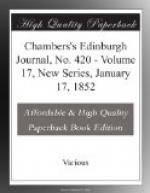On his return to Edinburgh, Jackson married a lady of fortune, the daughter of Dr Stephenson, and niece of his old friend Colonel Francis Shelley, of the 71st regiment; and was enabled by this accession to his means once again to visit Paris, where he not only resumed his medical studies, but acquired the mastery of several languages, Arabic amongst the rest. Having graduated M.D. at Leyden, he came back again to England, and commenced practice at Stockton-upon-Tees, in Durham. Although his reputation speedily became considerable, especially in cases of fever, he seems scarcely to have liked his new avocation. He found solace, however, in his favourite study of languages, which he pursued with unremitting ardour—constantly reading through the Greek and Latin classics, and not only rendering himself familiar with the best works of the modern continental authors, but also with the literature of the Arabic, Persian, Hebrew, and Gaelic tongues. The Bostan of Saadi is said to have been one of his most favourite poems.
On the war breaking out in 1793, Dr Jackson—who, in 1791, had published a valuable work on the fevers of Jamaica and continental America—applied for employment as army-physician; but Mr Hunter, the director-general of the medical department of the army, considering none eligible for such employment who had not served as staffer regimental surgeon, or apothecary to the forces, Jackson agreed to accept, in the first instance, the surgeoncy of the 3d Buffs, on the understanding, that at a future time, he should be nominated physician as he desired. Mr Hunter, however, died soon after this; and his promise was not fulfilled by the Board which succeeded him in the medical direction of the army, and which appears to have pursued Dr Jackson with uniform hostility.




